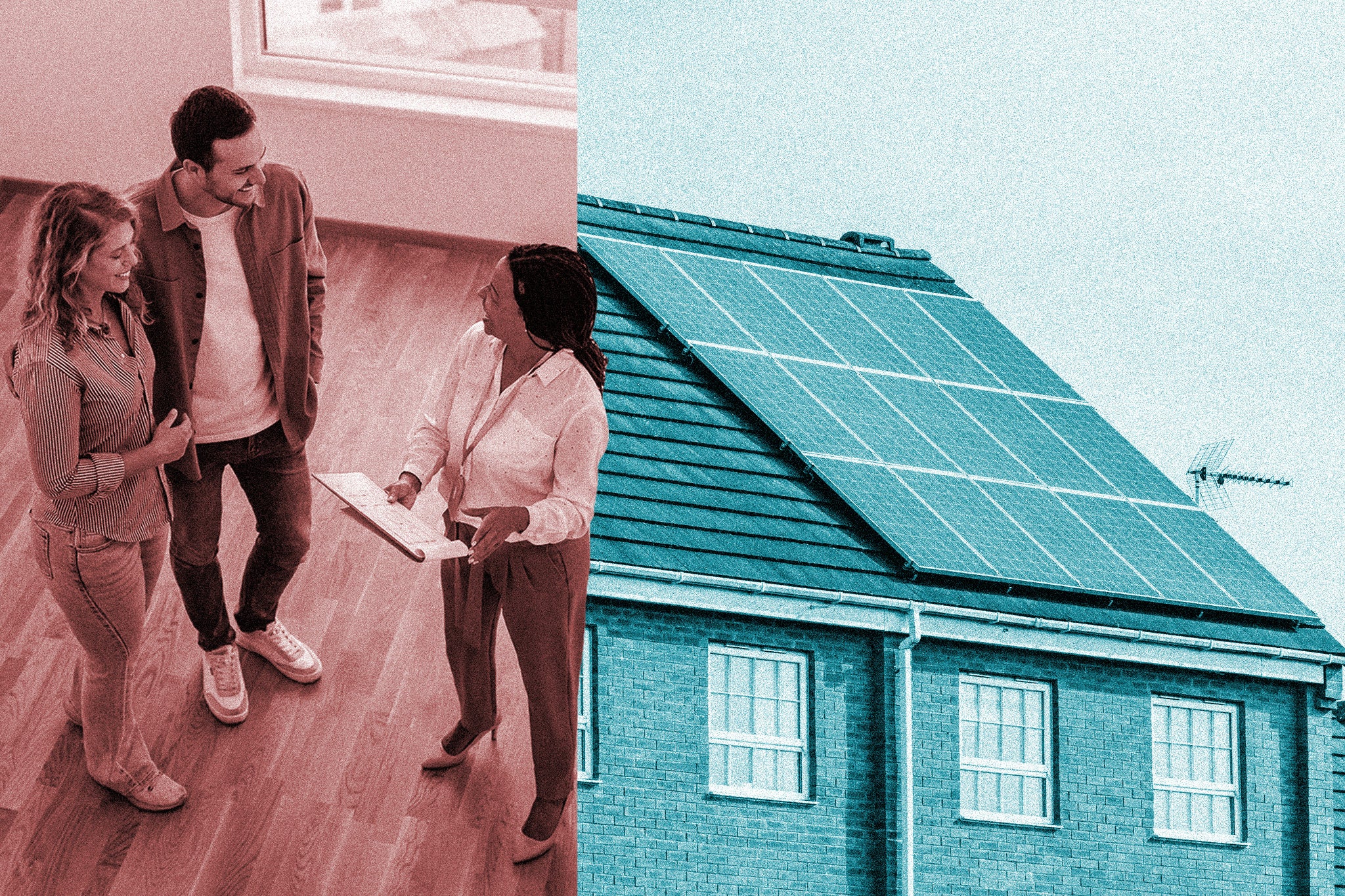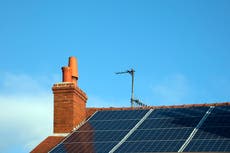The Independent's journalism is supported by our readers. If you submit a form or click links to other sites on this page, we will earn commission.
- Home improvement
- Solar Panels
Everything you need to know about buying a house with solar panels before making an offer
Jeff MeyerMonday 24 November 2025 10:35 GMTComments When buying a house with solar panels, it’s important to check ownership and warranties before making an offer. (The Independent)
When buying a house with solar panels, it’s important to check ownership and warranties before making an offer. (The Independent)With more than 1.5 million homes in the UK now generating their own electricity through solar panels, buying a place with solar panels is becoming a familiar scenario for house hunters. Panels can make a home cheaper to run and more sustainable, but they also introduce an extra layer of paperwork, maintenance and due diligence. Before you sign on the dotted line, it’s important to know exactly what you’re taking on.
As Manan Shah, solar expert with installer Solar4Good, explains: “When buying a home with solar panels already installed, it’s important to do some due diligence before signing anything.”
Understanding what to look for – from system ownership and certification to maintenance history and roof condition – can help you avoid costly surprises and ensure you’re getting the full benefit of the solar setup. Below, we outline the key checks every buyer should make before purchasing a property with solar panels.
Get a quote for solar panels for your home
Use our comparison tool to get a range of free quotes from leading installers across the UK.
Check the system’s age and condition
Solar panels typically last 25 years or more, but performance can drop slightly over time. Ask when the system was installed and look for visible signs of damage, shading from trees or buildings, or corrosion on the mounting frame. Most systems record their performance online, so request access to recent generation reports to ensure the panels are still working efficiently.
“Inverters typically last eight to 12 years,” says Shah. “So check if it’s due for replacement soon.” If the system is more than a decade old, factor the potential cost of a new inverter into your budget. (For reference, our guide to the cost of solar panels breaks down typical equipment and installation prices.)
Ask for key paperwork and certifications
The right paperwork is essential, both for safety and to qualify for energy payments. Without the correct documentation, you may struggle to access government schemes or prove compliance to insurers and mortgage lenders. If documents are missing, it can also be a red flag, suggesting the installation wasn’t MCS certified or that ownership could be unclear.
Don’t assume that the seller’s solicitor will have everything ready – it’s worth asking directly for copies early in the buying process.
Shah recommends asking the seller or installer for the following:
- MCS Certificate: confirms the system meets UK Microgeneration Certification Scheme standards.
- DNO approval letter: proof that the local Distribution Network Operator approved the connection.
- Electrical installation certificate: confirms the wiring complies with UK safety regulations.
- Panel and inverter warranties: check their validity and whether they can be transferred to you.
- Proof of ownership: to confirm whether the panels are owned outright or leased.
- Building Control approval: especially important for older or roof-mounted systems.
Having these documents ready can also make the conveyancing process smoother, as your solicitor will need to review them.
Recommended How much electricity does a solar panel produce?
How much electricity does a solar panel produce? Solar panel battery storage: What are solar batteries and how do they work at home?
Solar panel battery storage: What are solar batteries and how do they work at home? Solar panel efficiency explained: how much power do panels really produce?
Solar panel efficiency explained: how much power do panels really produce? Are solar panels worth it in the UK? An expert guide on how they work for your home
Are solar panels worth it in the UK? An expert guide on how they work for your home
Clarify ownership and Feed-in Tariff status
Who owns the solar panels – and whether the system earns payments under older government schemes – can significantly affect the home’s value and future savings.
Shah explains: “Ownership matters a lot. If the panels are owned outright, you’ll get all the energy savings and any Feed-in Tariff (FiT) payments. But if they’re leased, a third party owns the panels and collects the FiT payments. This can complicate selling, refinancing or insuring the home.”
If the system was installed before March 2019, check whether it’s registered under the FiT scheme. Only panels owned outright can transfer those payments to a new homeowner, and only if the original agreement allows it. Ask to see the original FiT paperwork and cross-check the installation date on the MCS certificate.
Understand the impact on mortgages and property value
Generally, buying a house with solar panels is viewed positively by valuers, especially when the panels are owned outright and improve the home’s Energy Performance Certificate (EPC) rating. Lower electricity bills can also boost a property’s appeal to eco-conscious buyers.
However, some lenders may be cautious with leased systems, as third-party ownership agreements can create legal complications. Always disclose any solar agreements to your mortgage provider early in the process to avoid delays.
If you’re curious about the financial pros and cons more broadly, our guide on whether solar panels are worth it explains the savings, payback periods and potential drawbacks in more detail.
Inspect and register the system after moving in
Once you’ve moved into your new solar-powered home, schedule a professional inspection to confirm everything is working as expected. “Schedule a professional inspection to check inverter performance, cabling, and panel output,” Shah advises. He also recommends cleaning the panels annually to maintain efficiency.
If the system uses a monitoring app, register your ownership to keep track of performance data. And don’t forget to transfer any warranties or service agreements; many manufacturers require notice within 30-60 days of a property sale.
Consider upgrades and add-ons
If the system is several years old, it may be worth upgrading components. “Upgrading the inverter to a modern hybrid or smart inverter can boost efficiency and allow battery integration,” says Shah. “Adding a battery can increase self-consumption and reduce reliance on the grid, but evaluate payback time.”
Battery storage can make a big difference in maximising the use of your own generated electricity. Our guide to the best solar panels also includes insights into pairing systems with home batteries for optimal performance.
However, if the panels are already registered under the Feed-in Tariff scheme and performing well, it may be better to leave the system unchanged to preserve those benefits.
Don’t forget insurance and roof checks
Before finalising your purchase, confirm that the panels are included in the home insurance policy. Insurers typically cover them for storm or accidental damage, but it’s worth checking if there are any exclusions.
During the survey, ensure your surveyor or installer checks the roof’s structural integrity. If the panels are roof-mounted, ask whether they were installed using a rail system or integrated in-roof design. Poorly fitted systems can sometimes cause leaks or loosen tiles, so it’s worth checking if the installer used weatherproof flashing and whether the fixings were inspected during the last roof survey.
It’s also wise to confirm whether the home insurance policy covers both the panels and the inverter. Some policies treat the inverter as separate electrical equipment and may not include it automatically. If the inverter is located in a loft or garage, make sure it’s adequately ventilated and not exposed to moisture.
For peace of mind, you can ask the installer to provide a maintenance plan or inspection report confirming the system’s condition and roof safety. This can reassure both you and your mortgage lender that the installation is sound and compliant with current standards.
Verdict: A bright investment – with the right checks
Buying a house with solar panels can be a smart move, offering immediate savings on energy bills and a smaller carbon footprint. But, as with any investment, it pays to do your homework. Check the paperwork, confirm ownership, and assess the system's condition before making an offer.
As Shah says, “Solar panels can be a huge benefit for new homeowners, but only if you know exactly what you’re getting.”
More about
Energyenergy efficiencyHomesJoin our commenting forum
Join thought-provoking conversations, follow other Independent readers and see their replies
Comments


